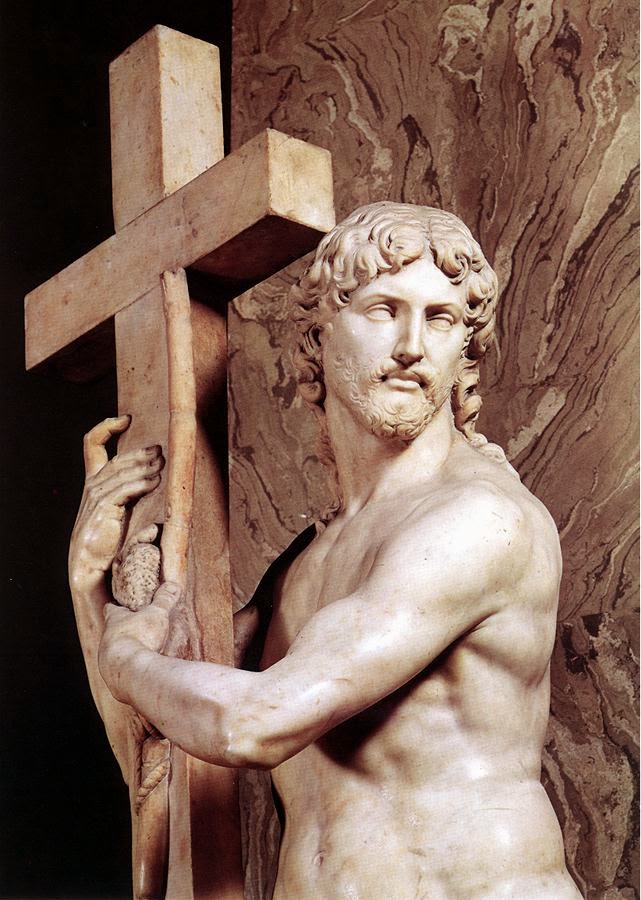Blessed
is the man who walks not in the counsel of the wicked,
nor
stands in the way of sinners,
nor
sits in the seat of scoffers;
but
his delight is in the law of the LORD,
and
on his law he meditates day and night.
He
is like a tree planted by streams of water,
that
yields its fruit in its season,
and
its leaf does not wither.
In
all that he does, he prospers.
The
wicked are not so,
but
are like chaff which the wind drives away.
Therefore
the wicked will not stand in the judgment,
nor
sinners in the congregation of the righteous;
for the LORD knows the way of the righteous,
but
the way of the wicked will perish. (Psalm 1)
We have seen God’s desire to communicate reflected in different ways in our celebrations of the last two days. Yesterday was the feast of the Archangels:
our word “angel” comes from the Greek ἄγγελος, which simply
means “messenger”. The function of
angels, at least as far as they concern us, is as carriers of God’s messages to
us. In addition to that, today is the
feast of St. Jerome, who is known primarily for creating the first complete and
reliable Latin translation of the Holy
Scriptures, making the Bible available to all those inhabitants of the Roman
Empire who did not know Greek. We honor St. Jerome because he made the word of
God available to so many people.
I couldn’t help thinking about the Archangels
and St. Jerome the other day when I was reading this column [here] by Star
Parker. Parker is reporting on a recent
survey by the Pew Center showing that:
Over the last 12 years, the percentage of Americans that
think religion is losing influence in American life has increased
dramatically. In 2002, 52 percent of
those surveyed said religion is losing influence. In 2014, 72 percent of Americans said
religion is losing influence.
 |
| Star Parker |
At the same time, Parker says, “fifty-six
percent say that the waning of religion is a bad thing compared to 12 percent
that say it is a good thing”, and she points to a Pew poll from 2012 that found
that 58 percent thought religion was “very important” against only 12 percent
who believed the opposite.
What are we to make of these figures? One would think that the large majority
decrying the decline of religion must nonetheless play some part in that
decline. I suspect that we are seeing,
at least in part, the struggle between our willing spirits and weak flesh
within our restless hearts: “Lord give me chastity . . . but not yet.” There are also more concrete
considerations. Parker, who was at one
time a single mother on welfare, and who credits the welfare reforms of the
1990’s with rescuing her from a life of dependency on government largesse, sees
the baleful moral consequences of such dependence as an important proximate
cause. Most Americans, largely out of a
sense of Christian Charity, supported the enormous expansion of government
assistance programs starting in the 1960’s.
Who appreciated that the program would undermine the very
religious, traditional values that keep families intact, essential for the work
ethic that leads people out of poverty?
Massive increases of government in the lives of low-income black
families were accompanied by a tripling of single parent households and
out-of-wedlock births, laying the groundwork for intergenerational
poverty.
Now it’s happening in the whole country. As we’ve gotten more government telling
Americans how to save for retirement, how to deal with their health care, how
to educate their children – American families have been damaged and
out-of-wedlock births have increased six-fold from 1960 to 42 percent
today. Government has displaced family.
But it’s not
simply about government. In fact, Parker
finds fault with both the Statists on the left and the Libertarians on the
right who see the government per se as the issue, as if adding more government
or radically cutting it will alone solve our social problems. No, “you can’t have a free society that is
not also a virtuous society”, and “we can’t separate our fiscal and economic
problems from our moral problems.” And
where does morality come from? Of course
. . . God’s Law.
I want to be clear that I’m not pushing
some kind of “Gospel of Prosperity”, but the discussion above does offer an
example of how God knows the truth about us, and that living by that truth
leads to happiness, while denying it brings on ruin. We know it from the messages carried by his
Angels, the Scriptures he inspired, and the Church he established. As the Lord Himself tells Moses:
For this commandment which I command
you this day is not too hard for you, neither is it far off. It is not in heaven, that you should say,
'Who will go up for us to heaven, and bring it to us, that we may hear it and
do it?' Neither is it beyond the sea, that you should say, 'Who will go over
the sea for us, and bring it to us, that we may hear it and do it?' But the
word is very near you; it is in your mouth and in your heart, so that you can
do it. "See, I have set before you
this day life and good, death and evil. If you obey the commandments of the
LORD your God which I command you this day, by loving the LORD your God, by
walking in his ways, and by keeping his commandments and his statutes and his
ordinances, then you shall live and multiply, and the LORD your God will bless
you in the land which you are entering to take possession of it. (Deuteronomy 30:11-16)















